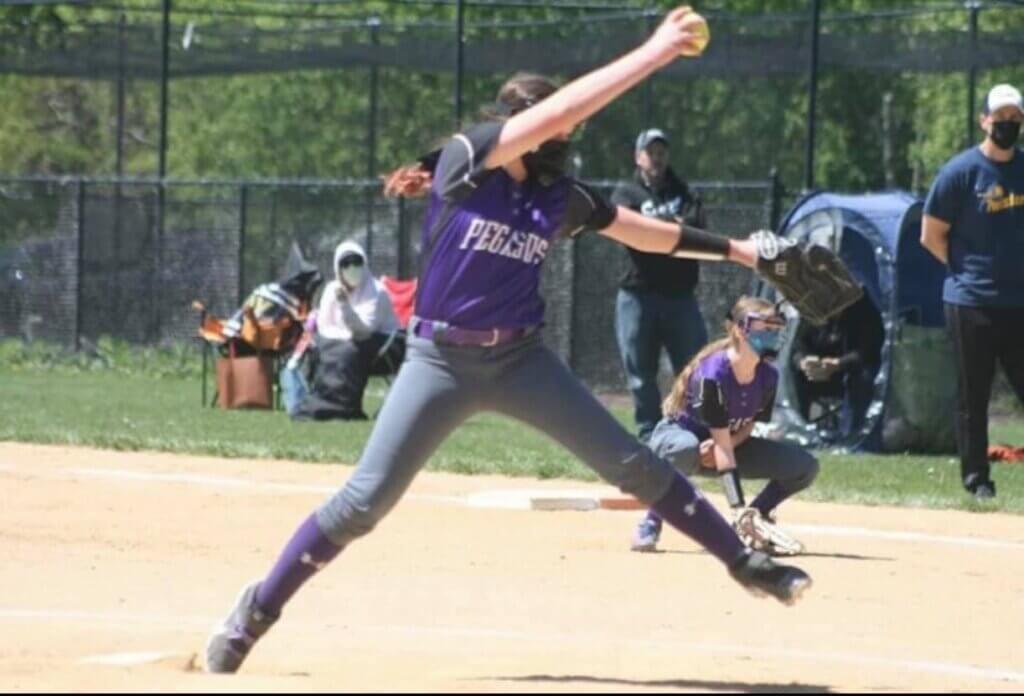
Teagan Ladigoski is a Class of 2027 pitcher and first baseman who was chosen as one of 20 students among over 200 eighth graders in her school district to give a speech in late March, 2023, at Interboro High School in Prospect Park, Pa.

A member of the Pegasus 14U Black team coached by Dennis Wolf, Teagan spoke on a subject very important to her, “Challenges in Youth Sports” and says:
“I want to get the word out about this issue after I almost quit playing softball last season due to anxiety and depression.”
The young athlete chose to look for a new team and found an “amazing one” in Pegasus, which is headquartered in Exton, Pa.—a suburb of Philadelphia.
Coach Wolf raves about his young player:
“Teagan is a great kid and teammate,” he begins. “She’s coachable, open to feedback, has suggestions and ideas on her game and is a great student also.”
Currently, the Keystone State standout is playing for her Interboro District middle school where she has pitched 10 innings and recorded 26 strikeouts while batting .615 with two home runs. Teagan is also a member of the Junior National Honor Society and Student Council for her school.
In her speech, which runs about three and a half minutes, Teagan concludes:
“Depression is a life-changing emotion… we need to stop it, before it stops you.”
Here is the speech in its entirety… Note: the transcript of Teagan’s comments are posted below the video clip.
Challenges in Youth Sports: Depression in Athletes
By Teagan Ladigoski
You’re JUST. NOT. GOOD. ENOUGH.
That is what my 12U softball coach told me when our team lost a game. According to ascm.com, 35% of elite or college athletes deal with depression, disordered eating and/or anxiety. This is a problem because young athletes harming or even killing themselves.
Depression and anxiety does not only affect college athletes, but it also affects young athletes like me.
Some of the main reasons athletes become depressed are from coaches, overtraining and, sadly, themselves. Coaches constantly tell people to do better or try harder but they don’t realize what it is like in our shoes.
Throughout the years, sports have gotten harder so people have to train more. This causes young athletes to overwork themselves which can cause injuries and depression. When you are an athlete with an injury, you could be out for weeks—even months—which can cause you a set-back and you will be a bit behind on the practices and games which is another reason athletes get depressed.
An NCAA study found 30% of surveyed athletes feel extremely overwhelmed with nearly 25% feeling mentally exhausted.

When you are constantly told to get better, you get angry at yourself. You convince yourself, “I’m not good enough, I will never be good enough.” Which is exactly what happened to me last year.
My softball coach would tell me: “You’re the reason we lost! You’re just not good enough! You’ll never make!… straight to my face.
Imagine being a young softball player who’s trying her best, day-by-day, hearing these harsh words thrown at her all the time by a grown adult… somebody who is supposed to be a role model and positive force in your life.
When I made a simple mistake—like missing a ball or getting out—I was told if I didn’t make that mistake, we would have won. If I was better, we wouldn’t lose, even though other girls on my team made mistakes just as bad.
This caused me to feel horrible about myself and not want to play the sport I love. My coach would overwork my team for days and then get mad when we lost. He did not care about the experience, he cared about the trophies and medals.
My coach failed to realize that sports serve a bigger purpose and have a bigger meaning that just where you finish. Sports can be building blocks for self-confidence, teamwork, resilience and discipline.
Sports should never break you down!
Imagine a world where people are excited to play a sport. They don’t become depressed from something they once loved. Parents would not lose their children because of a game. Sports should encourage kids to participate, not scare them away because of the fear of failure.
We are able to do all of those things because we have resources like therapists and just people we trust to talk to about our issues—our parents, friends, family, etc. We can act upon the issue, not just worry about it.

Talk to someone who has been in your situation. Don’t stress about things you don’t need to worry about. Teach athlete that winning is not the only thing that matters, it is the experience and sportsmanship. We could find better coaches who love the sport and are willing to win and lose for the sake of their team.
Luckily, I chose to leave my old team and I recently joined a team that appreciates me. They pick me up when I feel down. When I leave a practice, I feel I’ve learned something new, something useful I don’t get screamed at when I make a mistake. The coach teaches me how to fix it, they don’t blame me.
This is why I need people like you to talk to someone to ask how they are. If you see someone you know acting different or weird, don’t watch what happens—change what happens!
My call to action is to encourage others. Nobody should have to be made to feel bad about themselves in athletics. Nobody should experience depression due to sports.
Even if it means taking a break from something you love, I want the high numbers of depressed athletes turning to zero. I want to let you know you ARE good enough!
In conclusion, depression is a life-changing emotion. We need to stop it, before it stops you!
Check out our other EIS links:
Find us on Instagram ~~~ Find us on Twitter ~~~ Find us on Facebook
EIS Online Store ~~~ Sign up for our Newsletter ~~~ Check out our Team Subscriptions
Check out our latest Podcasts ~~~ Advertise with Us! Check out our Rate Card











